Commentary
Consider just how fortunate we are to have the Twitter Files. Every few days, we are seeing dumps of documents from the operations of Twitter before Elon Musk took over. This weekend’s release was especially shocking. It revealed a close and symbiotic relationship between the company’s management and the FBI, which employs 80 people to police social networks and flag posts. They aren’t looking for crime. They were focused on wrongthink on matters of politics.





